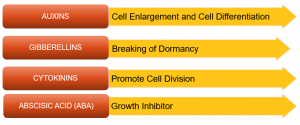What are Plant Hormones (PHYTOHORMONES )
Phytos means “Light” as plants respond to sunlight for Growth.
Plant Hormones carry out the Control and Coordination in plants. They coordinate the plant activities by controlling the growth.
Apart from Growth, Other activities like Stomata Control, Formation of Flowers, Fruit Growth, Ripening of Fruits, Falling of Leaves, are all controlled by the action of Plant Hormones.
There are 4 types of Plant Hormones:
Auxins, Gibberellins, Cytokinins, Abscisic Acid (ABA)
Types of Plant Hormones

AUXINS
These promote Cell Enlargement and Cell Differentiation. They promote Fruit Growth. They Control a plants response to Light and Gravity. This means that they are Phototropic (help the shoot to respond to light and help it grow upwards towards light) and Geotropic (help the roots to grow down wards towards gravitational pull). They are produced on the tips of Stems and Roots. They are also used synthetically in Agriculture and Horticulture.
GIBBERELLINS
These like Auxins help promote Cell Enlargement and Cell Differentiation. They are responsible for the breaking of Dormancy in seeds and buds. They promote Fruit Growth and also help in the elongation of shoots.
CYTOKININS
These promote Cell Division. They delay the ageing in Leaves and the Breaking of Dormancy in Seeds and Buds. . They promote Fruit Growth and also help in the opening of the Stomata.
ABSCISIC ACID (ABA)
These function mainly a Growth Inhibitor. Unlike “Breaking of Dormancy”, ADA hormones help in the Dormancy of seeds and buds. They also help in the closing of Stomata and in the promotion of Wilting and Falling of Leaves. It also causes detachment of Flowers and Fruit